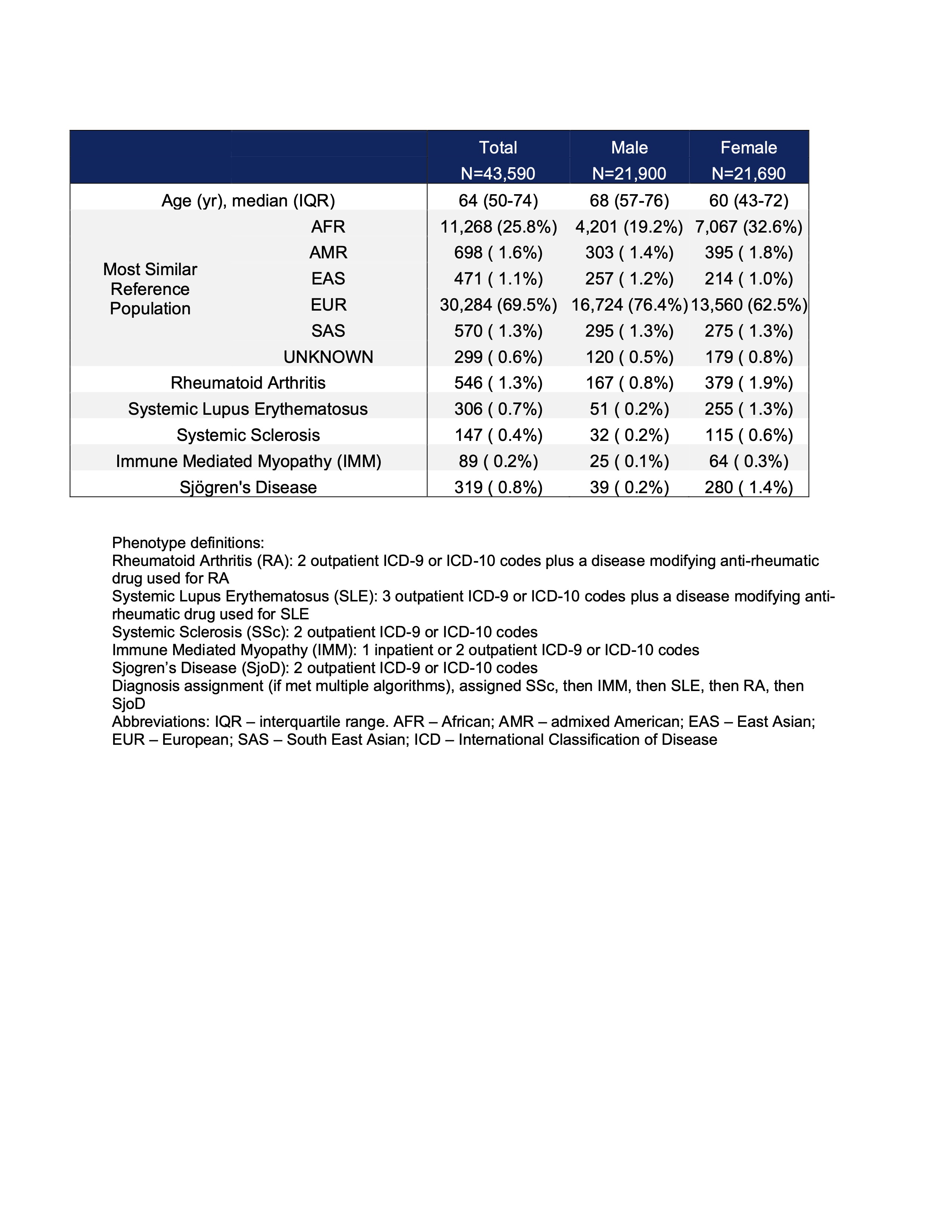Session Information
Session Type: Poster Session A
Session Time: 10:30AM-12:30PM
Background/Purpose: The mechanisms underlying female sex bias in autoimmune diseases remain unclear. Recent work has suggested that impaired maintenance of X-chromosome inactivation (XCI) in female murine immune cells can result in systemic lupus erythematosus (SLE)-like phenotypes. XIST (X-linked) encodes a long non-coding (lnc) RNA that helps maintain XCI in XX individuals. The Genome-Tissue Expression (GTEx) study has identified genetic variants that are expression quantitative trait loci (eQTL) for XIST or its X-linked positive regulator lncRNA FTX. This study hypothesized that eQTLs which lead to decreased expression of XIST or FTX in immune tissue would be positively associated with risk of female-biased autoimmunity.
Methods: Participants in this study come from the Penn Medicine Biobank (PMBB), a health system-based biorepository. Participants underwent genotype sequencing using the Illumina Global Sequencing Array v2 by the Regeneron Genetics Center (Tarrytown, NY). Imputation was performed using the TOPMED Imputation Server. eQTLs associated with decreased expression of XIST and FTX in human splenic tissue were identified using the GTEx portal. Cases were identified using ICD-code and medication algorithms for SLE, systemic sclerosis (SSc), dermatomyositis or polymyositis (immune mediated myopathy, IMM), and Sjögren’s Disease (SjoD). RA, a more modestly sex-biased disease not previously associated with X chromosome dosage, was selected as a negative control outcome. Logistic regression was performed to test the association of eQTLs with female-biased autoimmune disease, adjusted for the first 10 principal components of population structure and stratified by female sex. Using the Benjamini-Hochberg false discovery rate, a p-value < 0.0056 was considered significant.
Results: Among 43,590 individuals in PMMB, 21,690 (49.8%) were female (Table 1). By autoimmune condition, 546 (1.3%) had RA, 319 (0.8%) had SjoD, 306 (0.7%) had SLE, 147 (0.4%) had SSc, and 89 (0.2%) had IMM, with a higher prevalence in females compared to males. eQTLs associated with decreased FTX in the spleen were associated with increased risk for SLE in females; the strongest associations were for rs201911656 (T >TA) with OR 1.57, but did not meet experiment-wide significance thresholds (p = 0.009, Fig. 1, Table 2). eQTLs associated with decreased XIST expression were not statistically significant for individual conditions, including RA (Fig. 1). Examining the risk in diseases previously associated with X chromosome dosage (SLE, IMM, SjoD, and SSc), both XIST and FTX eQTLs were associated with higher odds of pooled autoimmune disease amongst females, but this result was not statistically significant (FTX rs11796715 (C >T) OR 1.21, 95% CI 1.02-1.45, p = 0.03).
Conclusion: Genetic variation associated with altered expression of regulators of XCI maintenance in immune cells was associated with increased risk for specific female-biased autoimmune disease, but did not reach experiment wide-significance thresholds. These results further suggest that impaired regulation of X chromosome dosage via decreased XIST expression may contribute to the female bias of SLE and other systemic autoimmune diseases.
 Table 1. Demographic and Disease Statistics within Penn Medicine Biobank
Table 1. Demographic and Disease Statistics within Penn Medicine Biobank
.jpg) Figure 1. Heat Map of eQTL and sex-biased autoimmune conditions within the Penn Medicine Biobank. eQTLs for FTX were associated with statistically significantly higher odds of systemic lupus, immune mediated myopathy, and pooled sex-biased autoimmune disease. Analysis was performed using logistic regression, adjusted for the first 10 principal components of population structure and restricted to female sex. *Bold font indicates associations with p < 0.05; no associations met the experiment-wide significance threshold < 0.0056.
Figure 1. Heat Map of eQTL and sex-biased autoimmune conditions within the Penn Medicine Biobank. eQTLs for FTX were associated with statistically significantly higher odds of systemic lupus, immune mediated myopathy, and pooled sex-biased autoimmune disease. Analysis was performed using logistic regression, adjusted for the first 10 principal components of population structure and restricted to female sex. *Bold font indicates associations with p < 0.05; no associations met the experiment-wide significance threshold < 0.0056.
Abbreviations: RA – Rheumatoid Arthritis; SLE – Systemic Lupus Erythematosus; SjoD – Sjogren’s Disease: ICD – International Classification of Disease; IMM – Immune Mediated Myopathy; SSc – Systemic Sclerosis; ACR – American College of Rheumatology.
.jpg) Figure 2. Association with autoimmune disease and FTX eQTL rs201911656. Logistic regression was performed to test the association of eQTL in an additive model with the female-biased autoimmune disease, adjusted for the first 10 principal components of population structure and restricted to female sex.
Figure 2. Association with autoimmune disease and FTX eQTL rs201911656. Logistic regression was performed to test the association of eQTL in an additive model with the female-biased autoimmune disease, adjusted for the first 10 principal components of population structure and restricted to female sex.
Abbreviations: RA – Rheumatoid Arthritis; SLE – Systemic Lupus Erythematosus; SjoD – Sjogren’s Disease: ICD – International Classification of Disease; IMM – Immune Mediated Myopathy; SSc – Systemic Sclerosis; ACR – American College of Rheumatology.
To cite this abstract in AMA style:
Riley T, DiRenzo D, Romich E, Levin M, Damrauer S, George M, Anguera M, Baker J, Jiwrajka N. Association of Genetic Variation in XIST and FTX with Susceptibility to Female-Biased Systemic Autoimmune Disease [abstract]. Arthritis Rheumatol. 2025; 77 (suppl 9). https://acrabstracts.org/abstract/association-of-genetic-variation-in-xist-and-ftx-with-susceptibility-to-female-biased-systemic-autoimmune-disease/. Accessed .« Back to ACR Convergence 2025
ACR Meeting Abstracts - https://acrabstracts.org/abstract/association-of-genetic-variation-in-xist-and-ftx-with-susceptibility-to-female-biased-systemic-autoimmune-disease/
